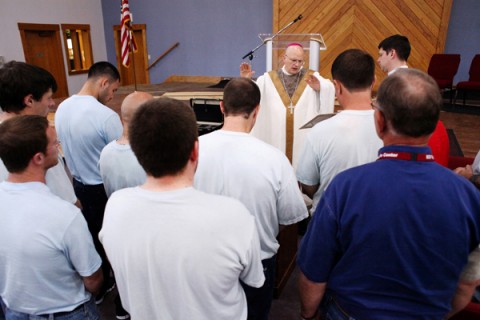November 10 | ![]() 0 COMMENTS
0 COMMENTS ![]() print
print

Christ’s mercy touches society’s untouchables
In a letter from America, BRANDON MCGINLEY describes how he joined a prison retreat and found that the love of God transcended social justice —By BRANDON MCGINLEY
We aren’t supposed to touch the inmates, but we break that rule immediately. After all, the entire point of ministering to prisoners is to treat them like real, normal, complete human beings. And for human beings, an integral part of interacting is touch.
On the first day of the three-day retreat, it’s mostly firm handshakes—especially for a first-timer like me. By day two, we are grasping shoulders and slapping backs. And after Mass brings the weekend to a close on Sunday, the farewells are all warm embraces.
Part of participating in prison ministry is recognising that you will, in all likelihood, hug a murderer. Or a batterer. Or a rapist. This is made easier, though, by the knowledge that these men have embraced the Lord, and He has embraced them back. If Jesus can bring these men into His heart, who are we to deny them our hearts—or our touch?
It is true that not every prisoner who attends our retreats is Catholic, or any kind of Christian at all. It is true that not every man is sincere in his interest in the Faith; some are just looking for a respite from the monotony of prison life.
But the sacristan who proudly showed me the monthly schedule of liturgical ministers he had compiled? The choir director who composes a new song every year to celebrate the Nativity of our Lord? The four men who inquired about becoming Catholic after only a long weekend of prayer and catechesis? Yes, I have no problem trusting their sincerity, and the reality of the Holy Spirit moving hearts in my presence.
It was the memory-haunted combat veteran, though, who left the deepest impression. He was not a man given to violence, but he joined the military to support his unexpected family. I don’t know what landed him in prison—it is bad form to ask and a bad idea to research—but it was what happened in the desert that still weighed on his heart.
On the second evening of the retreat, he returned to the Sacrament of Confession after 20 years away. I saw him—a trained soldier and stoic prisoner—sitting outside the priest’s office looking as nervous as a schoolchild awaiting an appointment with the principal. But afterward he had soft eyes, wet cheeks, and a boyish grin as he joined his fellow retreatants before the Blessed Sacrament.
Adoration that night may have been the most distinctly Biblical experience of our Lord I have ever had—with the exception only of Mass the next afternoon. Just as during His public ministry, there was Jesus Christ surrounded by notorious men who believed in Him and His life-giving love and mercy. They knelt. They prayed. They wept.
His power is made perfect in our weakness; despite their strong bodies, these men approached the Lord from a posture of weakness that was humble and pitiful and utterly inspiring. And so His presence seemed to transfigure their ugly brown Department of Corrections clothes, turning their bland uniformity into a glorious pageant—a living testament to the power of the Holy Spirit to turn our hearts to Jesus.
As I regarded the men during Adoration and Mass, I couldn’t help but consider the harsh dissonance between the gracious mercy of God and the futures the inmates face in this life. Some will never be released.
Those who are released will spend years on parole, and thereafter will carry a stigma that will be reaffirmed on every job application and government form
And some will be on the sex offender registry until they die, often penniless and homeless.
The punishments our retreatants received may be just. The stigma may be unavoidable. The registry may be necessary.
I will not presume to judge these practices in this column.
I will merely observe this: The love and mercy of Jesus Christ transcend civil justice and social disgrace.
If our culture finds this scandalous, just as did the culture to which Jesus ministered, then that is all the more reason to accentuate the truth of His mercy for all, even and especially the notorious, in whose sincere repentance He especially rejoices—and so should we.
He touches the untouchables, and in so doing He heals them.
And so should we all reach out, bringing His peaceful touch to those who are said not to deserve it.










